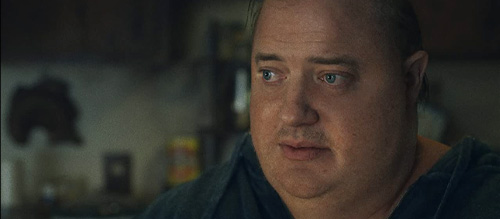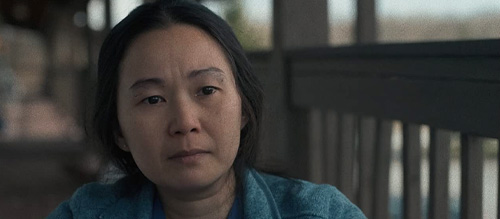The Whale (2022) Review

The Whale (2022)
Director: Darren Aronofsky
Screenwriter: Samuel D. Hunter
Starring: Brendan Fraser, Sadie Sink, Ty Simpkins, Hong Chau
Director Darren Aronofsky achieved fame and prestige when his sophomore directorial and screenwriting masterpiece Requiem for a Dream received an Oscars nomination for Actress In a Leading Role for Ellen Burstyn in 2001, and has since gained a reputation for depicting the horrors of human misery and exploring our tendencies towards self-destruction. It therefore comes as no surprise that he is found at the head of a project regarding the devastating consequences of addiction again, in 2023 Oscars contender The Whale. In addition to featuring the filmmaker’s auspicious return to the Hollywood director’s seat for the first time in more than five years, since 2017’s Mother!, this latest film’s reputation has been found to precede itself; Brendan Fraser’s six-minute standing ovation at the Venice Film Festival has now become the stuff of legend, the film hailed as Fraser’s triumphant return to the Hollywood elite.
Millions of hearts warmed at the sight of Fraser’s tearful and humble reaction to this praise, creating a huge adoring following for the already much-loved star of the Mummy franchise and a fervour surrounding his latest role. However, those familiar with the work of Aronofsky will not be tricked by the star’s heart-warming comeback story, knowing that The Whale will not be a standard weepy with a bittersweet twist. Aronofsky doesn’t shy away from the use of brutality and makes deliberate choices to create discomfort. The opening sequence itself is the metaphorical witnessing of a car crash: a sight so terrible that you can’t help but to stare in horror.
Based on the play of the same name by Samuel D. Hunter, The Whale follows a week in the life of Charlie (Brendan Fraser), a morbidly obese English Professor who does remote literature courses with his camera off, afraid of his students’ reactions at the sight of his physical appearance. The progression of the week shows Charlie’s body struggling with the consequences of his food addiction and binge-eating alongside his attempts to reconnect with his estranged daughter (Sadie Sink).
Aronofsky is regarded as an authority in the cinematic depiction of the miserable side of human existence and is not afraid to show the uncomfortable truths of it. However, some of the tropes surrounding Charlie’s obesity seem initially to be cheap titillation; sharing all the hallmarks of a typical episode of ‘My 600-lb Life’ – i.e. sequences of individuals gorging on junk food and their washing routines. There is an expectation of justification for what could be interpreted as lazy shock value; and indeed the film proves to be a frustrating watch, though it does reward the patient. The layers of Charlie’s story are meticulously pulled back to reveal a dazzling transparency, just like when a teacher reveals a life changing insight to a work of literature one couldn’t relate to.
This journey of frustration and vindication can be attributed to a combination of Brendan Fraser’s performance and Samuel D. Hunter’s storytelling. Charlie is seemingly continuously punished throughout the narrative, much to our indignation, as his charisma is instantly endearing: his few minutes of anonymised lecture suggests a pensiveness and a deep emotional intelligence. Even when in pain, his self-awareness of his appearance leads to a mindfulness so as to not try and cause distress to those not used to him. The Whale is a deep study of the fallibility of the human condition through the eyes of its central character, and the inevitable suffering caused by the seemingly innocent pursuit of happiness.
The faithful adaption of the play means that most of the film’s runtime takes place within the confines of his house and we are effectively flies on the wall. The limitations of his condition are tangible. The defensiveness of Charlie’s character arises from the omniscient view of his life – seeing more than his friends and family, such as the private moments of frustration arising from his eating disorder, but also his grief and guilt. The powerful empathy that is experienced is attributed to the fact that the screenplay of The Whale is semi-autobiographical: Samuel D. Hunter has struggled with a binge eating disorder (BED). Thus, anyone who has dealt with similar issues to Charlie (eventually inevitably), including but not exclusively eating disorders, addiction, grief, depression and self-loathing, can see an accurate reflection, but importantly one without condemnation. Spiteful binge-eating in response to emotional pain is relatable, which is where the distress of this story actually arises from.
Hunter’s personal and hence inexhaustible knowledge of the personal issues that Charlie faces is the narrative source of frustration within The Whale. It is not difficult to understand that Charlie’s character is more than what is happening to him – Brendan Fraser’s performance depicts Charlie as a kind man with a gentle intelligence. It is also not difficult to understand why his eating disorder has gotten out of control when Charlie is so obviously deeply hurt. Instead, there is a desperate need to understand the tragedy that has caused this pain, especially as it is the cause of why Charlie is the recipient of so much berating, disgust and even outright hatred, hence the significance of the other players in this film.

The Whale features a startlingly accurate account of the emotional fallout of loss, and this is due to its intricate and multi-faceted approach to storytelling. For example, the other people in Charlie’s life – such as his friend Liz (Hong Chau), his daughter Elle (Sadie Sink), and the missionary Thomas (Ty Simpkins) – represent Charlie’s struggle with his autonomy, with each thinking they know what’s best whilst causing additional pain via enabling his habit and through unsolicited advice. They are also the main narrative tools for the exposition of Charlie’s tragedy. Initially, the interactions of this ensemble feel clumsy and unsatisfying, the performances of Oscar nominee Hong Chau and Sadie Sink seeming particularly unnatural and stilted, but the intricacy of Hunter and Aronofsky’s storytelling is revealed when the emotional stakes are raised by the deterioration of Charlie’s condition. Here, the supporting performances are revealed to be their characters’ acts of self-preservation in the faces of their own hurt – they reveal a startling clarity of the entrenched trauma caused by the actions of those they love.
Consequently, the masterful and frugal storytelling of The Whale makes the act of watching this film – with its runtime of just under 2 hours, and its solitary major setting – feel like the in-depth account of an entire lifetime. Most disturbing is that it presents a life that seems to be slipping out of our reach: Aronofsky’s unshakeable bravery in the rawness of his actors’ performances will leave hearts racing in their chests. In The Whale, grief becomes submersive.
The impressive elements of filmmaking in The Whale (particularly its writing and central performances) are so successful because like Charlie they are most concerned with truth. Again, “frustration” is a word that comes to mind because, as the film progresses, a final understanding arises as to why those in Charlie’s life are so angry with him, but this understanding is fully reconciled with the ultimate truth of the story and of life itself: that every human needs love and forgiveness.
Score: 21/24

